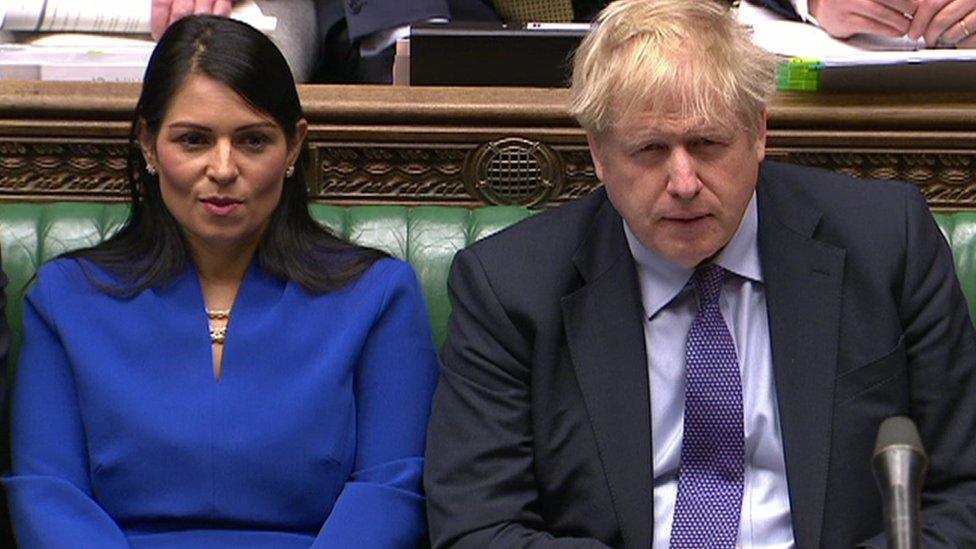Jeremy Corbyn attack on Boris Johnson during Commons deportation row
- Published
Jeremy Corbyn clashed with the PM over deportations
Jeremy Corbyn has launched a personal attack on Boris Johnson as the two clashed in Parliament over the deportation of foreign offenders.
The Labour leader accused the PM of misleading the country about the nature of offences committed, saying some deportees were victims of drug gangs.
Mr Corbyn said it showed the government had "learnt absolutely nothing" from the 2018 Windrush controversy.
Mr Johnson said the Labour leader had "demeaned himself" with the claims.
The PM defended the decision to forcibly remove 17 men to Jamaica earlier this week, telling MPs that while he couldn't comment on individual cases "it is entirely right that foreign national offenders should be deported from the country in accordance with the law".
The Home Office has said the criminals deported had combined jail sentences of at least 75 years, including two convicted of rape, one of whom was sentenced to 11 years in jail and the other to four years and six months.
On Tuesday, it released a list providing limited detail of the crimes of those on board the flight.
They included one persistent offender who had 24 convictions for 33 offences, another jailed for nine years for conspiracy to rob and possession of a firearm and another given a seven-year sentence for intent to supply class A drugs.
During heated exchanges at Prime Minister's Questions, Mr Corbyn referred to the Windrush controversy, in which a number of British citizens were wrongfully detained and, in some cases, deported.
'Misleading'
He asked the PM whether it was right that one of those deported this week was a black man who had come to the UK when he was five, who committed a single drugs-related offence after being groomed by "county lines" gangs but had not subsequently re-offended.
"This cruel and callous government is trying to mislead the British people into thinking that it is solely deporting foreign nationals who are guilty of murder, rape and other serious offences," he said.
"This is clearly not the case."
The Labour leader asked: "If there was a young white boy with blonde hair, who later dabbled in class A drugs, and conspired with a friend to beat up a journalist, would he deport that boy?
"Or is it one rule for young black boys from the Caribbean, and another for white boys from the US?"
Downing Street said the man Mr Corbyn was referring to had not been deported on Tuesday's flight.

The prime minister was born in the United States, and has faced questions about past drug use.
He was asked about claims that he had taken cocaine at university by Marie Claire Magazine in 2008. He said, "that was when I was 19".
In an appearance on Have I Got News For You in 2005, he admitted being given the drug, but suggested he hadn't actually taken it: "I think I was once given cocaine but I sneezed and so it did not go up my nose. In fact, I may have been doing icing sugar."
While he was working as a journalist in the early 1990s, Mr Johnson had a conversation with a friend , Darius Guppy, who had been demanding the private address of a News of the World journalist.
A recording of the call suggested Mr Johnson had agreed to supply the details, even though Guppy, who was later jailed for fraud, had indicated he had wanted to have the reporter, who had been investigating his affairs, beaten up.
In a BBC interview in 2013, Mr Johnson stressed that "nothing eventuated" from the conversation and that people often said "fantastical things" to close friends of theirs.
Reputation of Windrush generation
Responding to Mr Corbyn, Mr Johnson said the Labour leader had "no right to conflate" the actions of those deported this week with the mistreatment of the descendants of Windrush families who came from the Commonwealth to work in post-war Britain.
"I think quite frankly the honourable gentleman demeans himself and besmirches the reputation of the Windrush generation who came to this country to work in our public services and teach our children, to make lives better for the people of this country."
Mr Corbyn also called for Dominic Raab to be removed as foreign secretary, accusing him of misleading the family of Harry Dunn over the true identity of Anne Sacoolas, the woman suspected of causing his death by dangerous driving outside a US air base last summer.
He said it had been "widely reported" that Ms Sacoolas, whose extradition the US has rejected on grounds of diplomatic immunity, worked for the CIA while in the UK, suggesting this information had been withheld from the family.
Mr Johnson rejected this, saying the US authorities had told the Foreign Office that Ms Sacoolas had "no official role".
He pledged to continue to press the US to allow her to face justice in the UK while acknowledging the extradition treaty between the two countries was "imbalanced".